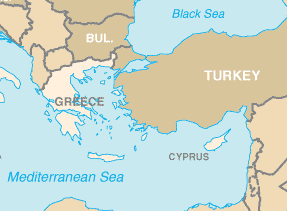 A man claiming to be wearing an explosive vest hijacked an EgyptAir plane on Tuesday, forcing it to land in Larnaca, on the southern coast of Cyprus, before he was arrested, according to the Cypriot government.
A man claiming to be wearing an explosive vest hijacked an EgyptAir plane on Tuesday, forcing it to land in Larnaca, on the southern coast of Cyprus, before he was arrested, according to the Cypriot government.
“It’s over,” the Cypriot Foreign Ministry announced at 2:41 p.m., after a standoff that lasted more than five hours.
Most of the 72 people on board were released after the flight was diverted while en route to Cairo from Alexandria, but the plane stayed on the tarmac, with the hijacker and seven or eight other people still on board. Then they were freed — or escaped, in one case, by leaping from a cockpit window — and, shortly afterward, the hijacker surrendered.
The hijacker, identified by Cypriot and Egyptian officials as Seif Eldin Mustafa, an Egyptian citizen living in Cyprus. He had told the pilot that he was wearing a suicide belt and threatened to detonate it. His motivation was unclear, but the state broadcaster in Cyprus reported that he gave a letter in Arabic demanding the release of female prisoners in Egypt and also called for a meeting with his ex-wife, who lives in Cyprus. She visited the airport and helped persuade him to surrender, the broadcaster reported.
Conflicting reports about the crisis from Egyptian officials — who for a time mistakenly identified another passenger as the hijacker — raised further questions about Egypt’s aviation security abilities, six months after a bomb brought down a Russian airliner in the Sinai Peninsula, killing all 224 people on board.
Citizens of at least eight countries, including the United States and Italy, were among the passengers, Egyptian officials said.
The passenger who had been mistakenly identified as the hijacker, Ibrahim Samaha, a professor from the University of Alexandria, later called the BBC and described what had unfolded.
“We had no idea what was going one,” Mr. Samaha said of the flight. “After a while we realized the altitude was getting higher, then we knew we were heading to Cyprus. At first the crew told us there was a problem with the plane and only later did we know it was hijacked.”
In a statement on its Facebook page, EgyptAir identified the flight as MS181 and said it left Borg el-Arab airport in Alexandria at 6.30 a.m, bound for Cairo. It was carrying 56 passengers, seven crew members and one EgyptAir security officer. (The airline had said earlier that there had been 81 people on the plane.)
The hostages remaining on the plane included two pilots, an attendant and the security officer, officials said. Some news outlets posted a picture of a man standing in the aisle of the plane, whom they identified as the hijacker.
Cypriot officials said the hijacker had initially demanded that the plane fly to Turkey but agreed to let it land in Cyprus after pilots told him they did not have enough fuel for a longer flight.
Hosni Hassan, a senior official at Borg el-Arab Airport, said by telephone that a majority of the passengers were Egyptian but that the passengers also included citizens from seven other countries, including Belgium, Greece, Italy and the United States.
The crisis had appeared to be coming to an early conclusion after the hijacker allowed 56 people to walk free from the plane. Video from the airport showed passengers walking down the stairs from the plane, an Airbus A320, and walking a short distance across the tarmac at Larnaca International Airport before boarding a bus. Many were walking calmly and carrying their luggage.
But six hours later, the hostage crisis appeared to be deepening amid reports that police at the Larnaca airport had moved back news crews at the airport and cleared nearby restaurants. Security forces took positions around the airport, and snipers were in place.
Mr. Mustafa, who was described as the hijacking suspect, is a 59-year-old former Egyptian army officer married to a Cypriot with whom he has five children, including a daughter who died in a car crash, according to Cypriot news reports that could not be immediately confirmed. He lived in Cyprus until 1995.
Egyptian authorities sent planes to pick up the freed passengers to return them to Egypt, while Cyprus-bound flights were being diverted to Pafos Airport, the country’s second-busiest airport, after Larnaca.
Aviation security in Egypt has been under scrutiny since a Russian airliner crashed shortly after taking off from the Red Sea resort of Sharm el Sheikh on Oct. 31, killing all 224 on board. A local affiliate of the Islamic State said it had brought down that plane with a bomb. Russia and Egypt attributed the crash to terrorism, although an Egyptian-led investigation has yet to publish its findings.
New York Times

Leave a Reply
You must be logged in to post a comment.